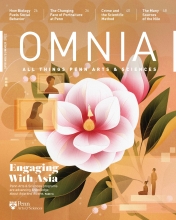Collaborative Knowledge
A message from editor Blake Cole
As we welcome the warm weather and spring blooms, we are excited to share the innovative research of Penn Arts & Sciences faculty and students. Due to national paper shortages, this spring-summer edition is a digital-only release, but rest assured that we are delivering the usual breadth of content. We hope to return to print as soon as possible.
In place of our usual message from Steven J. Fluharty, Dean and Thomas S. Gates, Jr. Professor of Psychology, Pharmacology, and Neuroscience, we instead sat down with him for a long-form discussion on advancing the vision for the School, which includes topics such as life on campus, accomplishments in the area of energy and sustainability, faculty recruitment, global impact, and more.
One of the areas of focus of this issue is how those within programs, departments, and centers collaborate to advance the study of critical topics. The cover story, “Engaging With Asia”, examines how Penn Arts & Sciences is advancing knowledge about Asia and Asians, through areas including Asian American Studies, the Kim Center for Korean Studies, and the Center for the Advanced Study of India. “Crime and the Scientific Method” spotlights the multidisciplinary faculty of the Department of Criminology—many of whom came from different academic backgrounds—and their commitment to harnessing diverse methodologies to improve public safety and inform policy and planning. And in “The Changing Face of Portraiture at Penn,” we look at how the Department of Biology is diversifying those honored in portraits, and rethinking how to approach representation through art.
We celebrate spring with “The Nature Connection,” which features photos of the campus in bloom, while exploring the healing potential of nature. And in a further examination of how nature relates to the human experience, “Under the Hood” profiles a researcher and his team’s examination of rhesus macaques, and how their social interactions can advance our understanding of decision-making and more.
We also highlight Penn Arts & Sciences research focused on international topics. In “Democracy in Africa,” a professor of Africana Studies discusses the state of democratic reform in Africa, while “Breathing New Life Into Cultural Heritage Sites,” tells the story of Penn researchers’ collaboration with partners in Iraq to restore the Monastery of St. George in Mosul.
Arts and sciences students are paving their own research paths. In “The Many Sources of the Nile,” a history and sociology of science Ph.D. graduate describes an artistic collaboration that disrupts long-standing narratives about the Nile River and its exploration. And “The Management of Science” follows an undergraduate proseminar that provides a deep-end introduction to how scientific discoveries can be brought to the market.
Students are also impacting the community. In a Q&A on the war in Ukraine, a Ph.D. student in history comments on how things got to this point, and what’s being overlooked in the discussion about the war. “Creative Writing for All” follows an undergraduate student’s quest to make writing education equitable—and fun—and “Feeding an Open Mind” aims to redefine food insecurity on college campuses.
Much more awaits in the pages ahead. Thanks, as always, for reading, and enjoy your summer.



